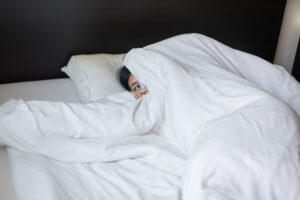LACK OF SLEEP
And The Nasty, Lesser Known Ways It Impacts You

Do you wake up on the wrong side of the bed often? Then you’re probably not getting enough shuteye. Unfortunately, sleep deprivation is extremely common in the U.S.: 11% of adults say they get insufficient sleep every night, and 70% claim they get insufficient sleep at least once a month.
If you’re used to getting by with minimal sleep, it’s time to change that! Quality sleep is beneficial for your overall health and well-being. Read on to learn some eye-opening facts about sleep and what you can do to restore restfulness back to your life.
1. Insufficient Sleep Can Wreck Your Libido
 Stress due to sleep causes the brain to suppress its production of sex hormones (both estrogen and testosterone), which can lead to infertility and erectile dysfunction. So, if you want a more fulfilled sex life, you may want to think about how often (and how early) you get between the sheets and shut off the lights.
Stress due to sleep causes the brain to suppress its production of sex hormones (both estrogen and testosterone), which can lead to infertility and erectile dysfunction. So, if you want a more fulfilled sex life, you may want to think about how often (and how early) you get between the sheets and shut off the lights.
2. Lack of Sleep Can Compromise Your Immune System
When you sleep, your immune system produces and releases proteins called cytokines, which target infections and inflammation. They also help you sleep better. Without proper sleep, your body can’t restore your immune system.
There’s even evidence that sleep deprivation can weaken the effectiveness of vaccines in fighting viruses like the flu. To combat this, you need more sleep! One proven method is to incorporate power naps into your day — two 30 minute naps a day, to be exact.
Anything more than 30 minutes risks advancing into a full sleep cycle, which can make it difficult to fall asleep before bedtime. Of course, you can also look for other ways to improve your immune system naturally if you’re not sure you can find the time to get more shuteye.
3. Sleep Deprivation Can Make You More Paranoid
 According to one study, lack of sleep can actually make you more susceptible to paranoia, hallucinations or — worse — delusions and even psychosis. While you’re probably not going insane, one similar (and more common) side-effect is dissociation.
According to one study, lack of sleep can actually make you more susceptible to paranoia, hallucinations or — worse — delusions and even psychosis. While you’re probably not going insane, one similar (and more common) side-effect is dissociation.
Broadly speaking, dissociative symptoms can range from just “zoning out” to out of body experiences and distortions in your sense of self. Talk about self-esteem issues, right?
4. Lack of Sleep Can Lead to an Increase in Risky Behavior
Are you making more bad decisions than usual? Sleep deprivation could be the reason. Studies show a link to an increase in risky behavior due to lack of sleep. In a nutshell, insufficient sleep may “increase many aspects of risk-taking,” like:
- Simple impairments in attention and judgment
- Greater willingness to accept risk
- A tendency to focus on short-term vs. long-term consequences
So if you’re feeling sleep-deprived, it’s best to rest up so you have sounder judgment and avoid making any rash decisions you may regret later.
5. Sleep Is Just as Important as Exercise
 It’s all too easy to deprive yourself of sleep if it feels justified. Fitness gurus and gym rats, we’re looking at you. While getting your daily dose of exercise may help you keep your sanity, prioritizing sleep is even more important.
It’s all too easy to deprive yourself of sleep if it feels justified. Fitness gurus and gym rats, we’re looking at you. While getting your daily dose of exercise may help you keep your sanity, prioritizing sleep is even more important.
Regular exercise makes it easier for the body to fall asleep. By reason, physical exhaustion is a great way to naturally get some quality rest. But, sporadic exercise, or exercising just before going to bed, makes it more difficult for the body to fall asleep.
Here’s why: Exercise, especially aerobic exercise, releases endorphins that stimulate activity in the brain, keeping you awake. The key is to finish exercising one to two hours before you sleep so your endorphins have time to cool down.
You might be asking, “When’s the best time of day to get my exercise in?” One study found that your body’s performance peaks in the afternoon, so an ideal time to hit the gym (or your yoga mat) is between 2pm and 6pm.
6. Sleep Deprivation Impairs Your Perception of Pain
 We’re talking physical pain here. Studies show that a lack of sleep can cause you to feel an increase in acute pain. What’s worse is that sleep deprivation can lessen the effect of drugs intended to alleviate pain, like opioidergic and serotonergic drugs.
We’re talking physical pain here. Studies show that a lack of sleep can cause you to feel an increase in acute pain. What’s worse is that sleep deprivation can lessen the effect of drugs intended to alleviate pain, like opioidergic and serotonergic drugs.
Hopefully you’re not at the point where you need such drugs, as they can have a pretty intense effect on the body, but it just goes to show how badly your body needs sleep on a daily basis.
7. Staying Up Too Late? You’re Probably Craving Junk Food
 That’s right. Lack of sleep actually makes you desire food — and not even good nutritious food, but the bad, “high-caloric content” types of food. That’s because sleep deprivation releases hormones called endocannabinoids, which make you crave bad stuff like chips and ice cream (the same hormone that causes the munchies when you… you know).
That’s right. Lack of sleep actually makes you desire food — and not even good nutritious food, but the bad, “high-caloric content” types of food. That’s because sleep deprivation releases hormones called endocannabinoids, which make you crave bad stuff like chips and ice cream (the same hormone that causes the munchies when you… you know).
For this reason, sleep deprivation is believed to be a cause of obesity. So, lack of sleep can be a double whammy if you’re trying to diet. So is there a solution? You can start dieting and eating foods that naturally increase your brain power, but you should make sure to fit in your meals at the right time of day. Look no further than the Chinese body clock. It’s a great way to learn the optimal times of day for all your meals and other activities like exercising, too.
8. Sleep Deprivation Makes You Less Empathetic
Another study linked sleep deprivation to a lack of empathy. According to the study, when you’re not well-rested, you have a harder time seeing someone else’s perspective on a given issue, and you’re less able to recognize or internalize their feelings.
Going out on a leap here, if you’re finding yourself arguing more than normal with your co-workers or those dear to you, the root of the problem may be sleep. Try resting more so you’re more agreeable, too — it may just be the solution you need.
5 Quick Pointers to Help You Get More Sleep
 So that you’re not left in the dark, we’ve included a few quick tips to get your sleep schedule back on track!
So that you’re not left in the dark, we’ve included a few quick tips to get your sleep schedule back on track!
- Stick to a strict sleep schedule. No one is telling you when to go to bed (or when to get up), but establishing and sticking to a sleep routine will help your body drift into sleep faster.
- Start taking Eastern medicine herbs and extracts that promote sleep. Eastern medicine herbs, extracts, and herbal formulas are a completely natural way to ease your body and mind into sleep after a long day. Some natural solutions to look into are:
- Chai Hu Long Gu Mu Li Tang and Suan Zao Ren Tang: This combo approach can help to get you in the zen zone and sleeping more soundly. Check out lunawell, an herbal tincture bringing the best of these in one easy-to-take form.
- Jujube fruit: May improve sleep quality, while extracts made from jujube seeds may increase the length of users’ sleep cycle.
- Chrysanthemum: Research shows that inhaling the fumes of chrysanthemum extract may reduce blood pressure, heart rate and may help to reduce anxiety and promote sleep.
- Goji berries: Research shows that drinking goji berry juice daily can improve sleep quality, increase energy levels, and even boost athletic performance.
- Say goodbye to your snooze button. Once you’ve established a sleep schedule that works for you, make a habit of getting up at the same time on the weekends.
- Spend more time outdoors. Your brain produces melatonin when it gets dark, so exposing yourself to more daylight will help you balance your circadian rhythm.
- Eat an early dinner. Eating earlier in the evening (say 6pm or 7pm) will give your body time to digest your food before you go to sleep.
Got any more sleep recommendations? Drop them in the comments!
Newer
3 Ways To Rebalance Your Body With Eastern Medicine
Older
Meridian Breakdown 101: What They Are and Why They’re Important
Comments (0)
Leave a reply
You must be logged in to post a comment.




